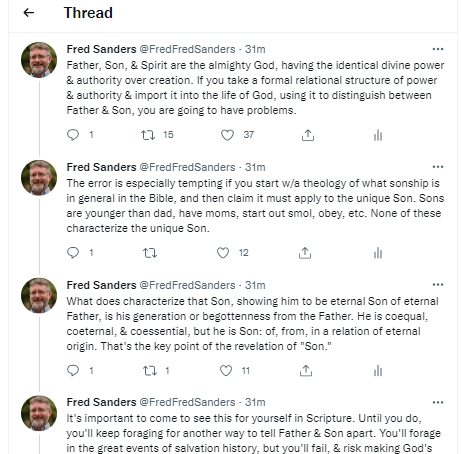A scene from The Canterbury Psalter (12th century)
Blog
Authority Under, Not Within, God
[This blog post is an archive of a thread I posted on Twitter, Nov 2021. I’ve left it in Twitter format (ten tweets, 475 words) because the temptation to expand and improve it is a temptation to write something rather long.]

Father, Son, & Spirit are the almighty God, having the identical divine power & authority over creation. If you take a formal relational structure of power & authority & import it into the life of God, using it to distinguish between Father & Son, you are going to have problems.
The error is especially tempting if you start w/a theology of what sonship is in general in the Bible, and then claim it must apply to the unique Son. Sons are younger than dad, have moms, start out smol, obey, etc. None of these characterize the unique Son.
What does characterize that Son, showing him to be eternal Son of eternal Father, is his generation or begottenness from the Father. He is coequal, coeternal, & coessential, but he is Son: of, from, in a relation of eternal origin. That’s the key point of the revelation of “Son.”
It’s important to come to see this for yourself in Scripture. Until you do, you’ll keep foraging for another way to tell Father & Son apart. You’ll forage in the great events of salvation history, but you’ll fail, & risk making God’s being & identity depend on these actions.
The gospels are gloriously vivid in describing the Father-Son relation. They should be read as the payoff of the story that starts w/Genesis (one creator) & Exodus (I am that I am). Father, Son, & Spirit aren’t a group of divine people, 1 of whom commands & 2 of whom obey.
What we see in the incarnation is the coeternal/ coequal/ coessential 2nd person of the Trinity, in the form of a servant. He eternally stands w/the Father on God’s side of all authority, & w/us on the creaturely side.
To take the obedience on the creaturely side & claim that it characterizes the 2nd person as such (either giving his sonship its meaningful form, or, worse, constituting the sonship distinction altogether) is to get hold of revelation from the wrong end, & read it confusingly.
You can slot all of this (3 people of the Trinity, 1 of whom eternally commands & 2 of whom are by nature obedient to that other one’s will) into a traditional structure of trinitarian theology, borrowed from the creeds, & stay on team Trinity. But it’s a peculiar interpretation.
It meshes poorly w/biblical monotheism, & poses a complication in understanding the Bible’s main character. The question inevitably arises: why is it like this? The answer is, so we can imitate it. But that reverses the polarity that started with importing obedience into God.
Obvs much more could be tweeted about any of this, & my suggestions for further reading would be “almost anything old.” I just wanted to make the brief case in public for folks again. Not trying to re-litigate 2016. Trying to re-litigate the whole Bible & Christian tradition.
About This Blog

Fred Sanders is a theologian who tried to specialize in the doctrine of the Trinity, but found that everything in Christian life and thought is connected to the triune God.


